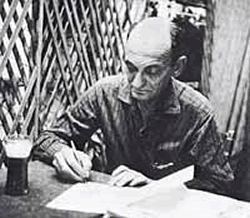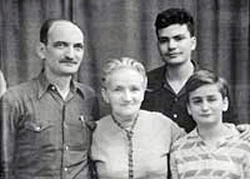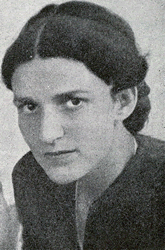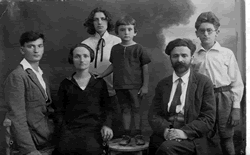Yonatan Ratosh (×™×•× ×ª×Ÿ רטוש), Israeli poet, was the
nom de plume of Uriel Shelach (×?ורי×?ל שלח). Born as Uriel Halperin (×?ורי×?ל הלפרין) in the Russian Empire ( Warsaw) in 1908 to a Zionist family. His father, Yechiel, was a Hebraist educator and raised Ratosh and his siblings (including linguist Uzzi Ornan) in Hebrew. In 1921, he migrated to Mandated Palestine to learn at the Hebrew University of Jerusalem. Adopting the pseudonym of Yonatan Ratosh, he began to write poetry that "tore apart" (Hebrew: ריטש - riṠṠêš) existing conventions of style, language, and culture. In the late 1920s, Ratosh (using his birth name, Halperin) embraced Revisionist Zionism , becoming close friends with Eliyahu Bet-Zuri and Avraham Stern. A talented writer, Halperin became the editor of the official publication of the Irgun, "Ba-Cherev" (בחרב, "By the Sword").
In 1937,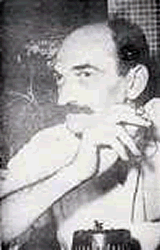
Jabotinsky demoted Halperin for the extremism of his views. Frustrated, he travelled to Paris to meet with another disillusioned Revisionist, Semitic language scholar Adia Gurevitch (A.G. Horon). Halperin and Gurevitch formulated "a new Hebrew consciousness" combining the former's political ideas with the latter's historical outlook. In their minds, the Jewish People were a part of a larger Hebrew civilization bound together by Canaanite languages and nationhood in Canaan . With the outbreak of World War II, Gurevitch went to America and Halperin returned to Palestine and began writing (as Ratosh) for Haaretz.
In an essay entitled "Ketav el ha-No'ar ha-'Ivri" (כתב ×?ל ×”× ×¢×¨ העברי, "Epistle to the Hebrew Youth") from 1943, Halperin/Ratosh presented his new ideas to the Hebrew-speaking public. This and other essays called for the community of the
Yishuv to divorce themselves from their Jewish roots and embrace a new identity as "Hebrews". A number of Sabras and long-established olim were drawn to his ideas, being disconnected from Diaspora Jewry, disillusioned after the Holocaust, and feeling alienated by the growing number of immigrats to Palestine. These "Young Hebrews" became better known as Canaanites, or part of a Canaanite movement - from a disparaging article by Haaretz editor Avraham Shlonsky .
Attempting to organize his followers, Ratosh started a Canaanite magazine called Alef in 1950. The publication only lasted a few years and while the Canaanites failed in organizing a mass movement, they had a profound impact on Israeli culture. Ratosh continued publishing poetry and enjoyed a brief renaissance as an ideologue after the
Six Day War. His political philosophy had an impact across the political spectrum: sharing the Right's irridentism and advocating a secular (in lieu of Jewish) state like post-Zionists, particularly radical peace advocate Uri Avnery. His last poem in book form was Hava ("Eve"), published in 1963 . In it, he reinterprets the story of the Garden of Eden as the coronation of a Rain God.
Ratosh died in 1981, leaving behind a number of children, including mathematician and
Israel Prize laureate Saharon Shelah , and grandchildren including Israeli anti-Zionist radical Oz Shelach, webmaster of http://www.oznik.com .
belated obituary:
Sabba, how do you say, in Hebrew, Decolonization?*
On the 20th anniversary of poet Yonathan Ratosh's death
Oz Shelach
6 Apr. 2001
Listening to memory I can hear my grandfather saying, his daughter in law's, my mother's name, grammatically emphasizing the last syllable:Illana. The menthol odor of Polaris cigarettes permeates the room; a bottle of 777 Brandy materializes on the table, and books cover the wall. My mother did not like the Hebrew name affixed to her when she was eight, replacing her original name, Liane. She disliked it even more when people corrected her in its pronunciation. She presented herself as Illana, emphasizing the middle syllable, the way most people pronounce this name. But Sabba knew what was right and what was wrong, determined what was right and what was wrong. In a poem my father, his son, liked to quote, he wrote: "In the beginning was Justice/ And Justice was with me."
Sabba was immersed in his life. He did not visit us much. We did not visit him much either. I grew to know him through relatives, friends, and books. They told me anecdotes. How in the 1930's he collected and constructed a Hebrew military vocabulary when he edited a booklet written by his terrorist friends, HaEkdo'ah, literally The Pistol. How for this purpose he invented a Hebrew word for "range," based on a similar word from the bible. How he denied knowing Yiddish. About his slip of the tongue, when he told a journalist that only someone born in Israel could be a true Israeli; forgetting that he was born in Warsaw himself.
His presence was well felt at our home. In the rich,accurate, sometimes literary language we spoke, in the love for word games, in the knowledge that language creates the world; and in our "Israeli,"or "Hebrew," or "Canaanite" identity. To this day the Israeli Ministry of the Interior grants members of our family, and no one else, identity cards that read "Nationality: Hebrew." Some of us, and I among them, carry these cards in spite of a Supreme Court ruling (!) that "Hebrew" is nothing but a synonym for "Jewish"; a kind of historical privilege, like, say in England, special permission to wear a red scarf in the presence of the Queen **. I was taught from a very early age that we are Israelis, that Judaism is a religion, and is behind us. I understood our identity primarily as a harsh debate with the state that refuses to recognize its own true identity, and ours; an unbridgeable gap between us and religious people, as well as Jews of all kinds.
I recognize this debate, but wish now to belittle its importance. All in all it was an internal affair, a private discussion among Jewish colonists in Palestine. As boring as the internal debate between religious and secular Jews in Israel. As heated and sterile as this last decade's debate about "Post"-Zionism. Like the supposed disagreement between open supporters of mass deportation and war criminals who speak highly of Peace; a false representation of an argument between parts that stand together as one body to block the gate, to barricade the border, to keep five million refugees locked outside the house.
And in these dark days, in the transition period between one murderers' government and the next, I was approached by an editor in Haaretz – a newspaper whose name alone, literally "The Land," or "The Country," illustrates its problematic status; a paper that Grandfather had once worked for; the very paper which, since the beginning of this current massacre, tries to include an op-ed by a Palestinian writer once a week – inviting me to write something about my grandfather, to mark the 20th anniversary of his death. A privilege of the kind that lands in the laps of me and my likes, the children of the oligarchy. Grandfather's poetry books are available from libraries ***, and I can look things up, even do some fact checking in the biography written about him,another one of those privileges etc… and say what I think.
I think the urge to erase Jewish identities is inseparably bound with the erasure of Palestinians. I think it is inseparably bound with the Zionists' embracing acceptance of the erasure of Jews from Europe and from the Arab world. I think my grandfather gave this urge an extreme variant – fascism with a particular fetish for language, so close in time and place to the Arab Ba'ath ideology, so disconnected from it – but that it characterizes the entire Zionist project from its inception to this day, inseparably bound with the wish to repress the big ethnic cleansing which is the state of Israel.
I think this urge is also manifest in our custom, us Israelis, to speak loudly, to correct everyone, to start whatever we have to say with "You need to understand that…" generally not to listen, not to listen to anyone who doesn't threaten us with violence, and, more than anything, not to listen to the refugees on whose destruction we live. Indeed, "Israelis," or "Canaanites", "Sabras," or "Settlers", how could we think of ourselves as locals if we notice the locals?
From my grandfather's poems those that interest me here were written in the 1930's, before the Canaanite ideology, before the "debate." But he considered them important. In 1969 he revised them and published them in a special limited edition, a facsimile of his handwriting, under the title "Sword Poems." Here are three examples from the chapter "Blood Poems":
Rot! Rot! […]
On the wall a foreigner stands And there is no hero among the people
("And he will ask")
In black conspire the tents of Arabs […]
And the alien is on the land of Israel […]
Wondering, rambling is a nameless Arab […]
And the enemy is on the land of Israel […]
Preparing, gathering is a nameless Arab […]
And the next morning, you will find my back stabbed
("Prazon")
And land was given - to the conqueror
("To the Dreamer")
"Foreigner…" "alien is on the land of Israel…" Poems of praise to robbery. Poems of service to arms manufacturers and real-estate dealers. Poems that are as appropriate to the first twenty years of the project as they are appropriate to the recent twenty.
There are many things I would like to ask my grandfather. About his childhood in Warsaw, about emigrating at age 11, about grandmother, about relating to women, about nationalism, about possible uses for talent and status. The conversations I would like to have with him I simulate on my own.
Let's say we are seated in a coffee shop, in Tel Aviv.
Sabba, I ask, how do you say, in Hebrew, decolonization?
He pours us generous portions from the bottle of cheap brandy.
Sabba, I ask, have you ever thought of writing in Yiddish? Or in Arabic?
Notes:
* This piece was commissioned by Haaretz Culture and Literature section and published on April 6, 2001, in an edition dedicated to my grandfather,Yonathan Ratosh (1908-1981). My grandfather was born Uriel Heilperin and later Hebrewized his surname to Shelach, but is best known by the pseudonym he used for his poems. In addition to poetry he wrote essays and polemics,and was a prolific translator of literature to Hebrew from French and English. To this day his poetry is considered innovative and influential among Hebrew poets. He was the prominent speaker for the highly controversial "Hebrew",or "Canaanite" ideology – professing the birth of a new Israeli nation,connected to the land and its pre-jewish Hebrew culture, calling for a total break from Judaism and Jews in the diaspora – arguably its founding father.
** Indeed the State of Israel does refuse to acknowledge an Israeli nationality. The said id cards, which all citizens and residents are required by law to carry on their body at all times, can state "Nationality: Jewish," or "Nationality: Druze," or "Nationality:Arab," but not "Israeli." 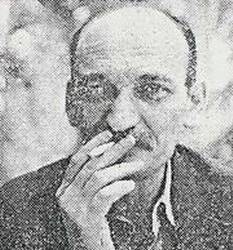
*** Even in NYC.
Oz Shelach is an Israeli writer, and journalist. He runs this web site, and his book, Picnic Grounds: A Novel in Fragments , was published by City Lights Books, SF, in 2003.
With his mother; Pnina and 2 sons;
Yonatan Ratosh was the mainspring behind the Canaanite idea. He was born in Poland in 1909 with the name Uriel Halprin. The name Ratosh was derived from the Hebrew verb "to rend."
He came to Eretz Israel in 1920, and received a basic Hebrew education. He continued his studies in Paris where he came under the influence of A.G. Choron. In addition to political activity, the arts also attracted him in his youth. In Eretz Israel he devoted himself to the Zionist revisionist movement, and in 1929 discovered his ideological brethren in the militant wing of the Revisionist Party such as Abba Achimeir's violent anti-British circle. Ratosh was one of the original leaders of the Irgun and was well acquainted with Avraham Stern (Yair) the LEHI leader.
In 1943 Ratosh joined the staff of Yarden, the Revisionist Histadrut's newspaper. His editorials blasted the Yishuv's policy of restraint toward the British. In a series of articles Ratosh demanded that a Jewish State must be immediately established.
The mainstream Revisionists were not ready to accept his radical anti-British activism; furthermore, they refused to swerve from Jabotinsky's line. Disappointed, Ratosh quit the movement and sailed for Paris in 1928 to study at the Sorbonne. There he met Adolf Gourevitch (Choron) who helped him focus his views and gain insight into an alternative historical perspective of the Jewish People. Ratosh formulated a new cultural-nationalistic outlook based on Gourevitch inspired Canaanite-Hebrew ideology.
Ratosh originated the Young Hebrews group whose members were mainly students and intellectuals from the Hebrew University in Jerusalem. The group was later more formally known as the "Committee for the Formation of Hebrew Youth" and attracted poets and artists. In the beginning the group's activity concentrated on the arts, but eventually it have entered the political arena where Ratosh's ideas struggled to make headway. Ratosh became a influence on a group of friends that included Eliahu Bet Zouri, who along with Eliahu Hakim would assassinate Lord Moyne, the British Minister of State in the Middle East, on November 6, 1944 in Cairo.
Ratosh was responsible for the monthly newspaper Alef. From 1948 to 1953 Alef was a weekly. He was a friend of Eliahu Bet-Zouri, who was one of the two assassins who were responsible for the attack on Lord Moyne in Cairo. Later Ratosh took the name Uriel Shelah. Among his best known works is his 1937 "Our Eyes Are Lifted Up to Domination: The Liberation Movement's Front of Tomorrow." Miryam was the sister of Yonatan. She was born in 1910 in Warsaw in 1919 she came with her family to Tel Aviv. SHE STARTED WRITING AT AGE 16. In 1936 she went to Paris to study. Her husband to be ( Menachem Dor) also came with her. They returned to Tel Aviv in 1938.
She wrote children' stories which were published in 'Davar Leyeladim". She passed away from complications during pregnancy in 1945.
Saharon Shelah
From Wikipedia, the free encyclopedia
Jump to: navigation, search
Saharon Shelah
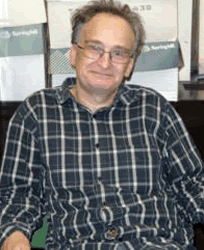
Professor Saharon Shelah in his office in Rutgers University , September 6, 2005. Photo by Andrzej Rosłanowski.
Born
July 3, 1945
Jerusalem , Israel
Residence
Jerusalem, Israel
Citizenship
Israeli
Nationality
Israel
Ethnicity
Jewish
Field
Mathematician
Institutions
Hebrew University, Rutgers University
Alma mater
Hebrew University
Academic advisor
Michael O. Rabin
Notable students
Rami Grossberg, Shai Ben-David, Menachem Kojman
Known for
Mathematical logic, Model theory , Set theory
Notable prizes
Wolf Prize, Israel prize
Son of Yonatan Ratosh
Saharon Shelah (שהרן שלח, born July 3, 1945 in Jerusalem) is an Israeli mathematician. He is a professor of mathematics at the Hebrew University of Jerusalem and also at Rutgers University in New Jersey, USA. Shelah's main interest lies in mathematical logic , in particular in model theory and set theory.
Shelah is one of the most prolific contemporary mathematicians. As of 2006, he had (together with over 200 coauthors) published nearly 900 mathematical papers. Among his most important results are:
in model theory, the introduction and development of his classification theory , which led him to a solution of Morley's problem
in set theory,
the invention of the notion of proper forcing, an important tool in iterated forcing arguments
PCF theory, which shows that in spite of the undecidability of the most basic questions of cardinal arithmetic (such as the continuum hypothesis), there are highly nontrivial ZFC theorems about cardinal exponentiation, after all.
Shelah also solved several outstanding questions from other fields, among them:
He constructed a Kurosh monster, an uncountable group for which every proper subgroup is countable.
He showed that Whitehead's problem is independent of ZFC.
He gave the first primitive recursive upper bound to van der Waerden's numbers V(C,N).
He extended Arrow's impossibility theorem on voting systems.
Shelah is the son of the Israeli poet and political activist Yonatan Ratosh . [1] He is married to Yael, [1] and has three children. [2]
[edit ] References
^ a b Shelah, Saharon (April 5, 2001). ×–×™×›×¨×•× ×•×ª×™×• של בן (Memoirs of a Son) ( (Hebrew)). Haaretz. Retrieved on 2007- 03-14. "כשע×?דתי להציג ×œ×¤× ×™ חברתי יעל (עתה רעייתי) ×?ת ×‘× ×™ ×?שפחתי…הפרופ' שהרן שלח ×?ן ×”×?×•× ×™×‘×¨×¡×™×˜×” העברית בירושלי×?, ×‘× ×• של ×™×•× ×ª×Ÿ רטוש… "
^ Réka, Szász (March 2001). Harc a matematikával és a titkárnőkkel ((Hungarian) ). Magyar Tudományos. Retrieved on 2007- 03-16. " Hungarian: A gyerekei mivel foglalkoznak? A nagyobbik fiam zeneelméletet tanul, a lányom történelmet, a kisebbik fiam pedig biológiát. What are your children doing? My oldest son is learning the theory of music, my daughter history, my youngest son biology. "
[edit ] External links
Saharon Shelah at the Mathematics Genealogy Project
Archive of Shelah's mathematical papers
Persondata
NAME
Shelah, Saharon
ALTERNATIVE NAMES
SHORT DESCRIPTION
Israeli Mathematician
DATE OF BIRTH
July 3, 1945
PLACE OF BIRTH
Jerusalem, Israel
DATE OF DEATH
PLACE OF DEATH
This Israeli biographical article is a stub. You can help Wikipedia by expanding it.
This article about a mathematician is a stub. You can help Wikipedia by expanding it .
Retrieved from "http://en.wikipedia.org/wiki/Saharon_Shelah"
Uzzi Ornan, another brother of Yonatan, was born in 1923. He is a visiting Professor at the Department of Computer Science. He has been teaching at the department since 1987, after serving as a Professor in the Department of Hebrew Linguistics at the Hebrew University of Jerusalem for many years. He received his Ph.D. in Humanities from the Hebrew University of Jerusalem in 1964. Being a linguist, he inclined to formal approach and followed Chomsky's ideas. Eventually he became acquainted with the computer and used it as a simulator for the linguistic ability and knowledge of humans. Professor Ornan published dozens of papers in Hebrew morphology, syntax, phonology and lexicography, as well as some books, among them "Grammar of Mouth and Ear" in 1947 and many later editions, Hebrew Syntax (1963, 69, 79),"Dictionary of Forgotten Words" (1996) and "The Final Word - Mechanism for Hebrew Word Generation" (2003).
library.osu.edu/sites/users/galron.1/00987.php
The Canaanite movement proposed a radical alternative to Zionism, and it had specific views about Hebrew, which were clearly voiced by two linguists who were activists in this movement, the brothers Uzzi Ornan and Svi Rin. (The leader of the Canaanite group was their elder brother, the poet Yonatan Ratosh.) Although the group was tiny, numbering some two dozen members at its peak, it had profound influence on Israeli culture, because it pressed on vulnerable areas of Israeli identity. Their views capitalized on a radicalization of intra-Zionist tendencies which were quite popular in the local Jewish community of the 1940s and 1950s, which idolized the healthy, tall, tanned, down to earth, native sabra "Jew born in Palestine/Israel" as the inverse image of the diasporic Jew. Significant numbers of youth and intellectuals felt both fascinated and challenged by Canaanism. Since most Canaanite activists were poets, authors, journalists, sculptors, educators and other disseminators of culture and ideology, their discourse reached all those concerned with the emergent Israeli identity.
The Canaanites redefined the forming nation as a new Hebrew (rather than Jewish) nation which had its roots in the glorious days of the Biblical era. They claimed that large parts of the Middle East, which they named the Land of Kedem (kedem "East/antiquity"), constituted in antiquity a Hebrew-speaking civilization. Hence the Hebrew renaissance should aspire to rebuild a nation based on the same geographical area, which should embrace the whole local population, liberating them from Islam and from pan-Islamic and pan-Arab tendencies. Both world Jewry and world Islam were viewed as medieval forces, keeping their adherents in uneducated darkness and away from secular enlightened modernity. Having its early roots in European extreme right-wing movements, notably Italian fascism, it exhibited an interesting blend of militarism and power politics towards the Arabs as an organized community on the one hand and a welcoming acceptance of them as individuals to be redeemed from medieval darkness on the other. Most of the Canaanites served in the right-wing undergrounds, the Irgun and the Stern Group, before and during the 1948 war, but at the same time they objected to the expulsion of Arabs aimed at the formation of a Jewish state, since such an expulsion merely transferred these Arabs from one part of the Land of Kedem to another.
Canaanism was anti-Zionist but no less revivalist. The collective entity revived nationally and linguistically was defined in different political terms: not Jews but Hebrews, not exclusive but inclusive of the indigenous population, but still revivalist. Canaanite discourse exhibits, therefore, both shared and disputed features with Zionist discourse. The same goes for the Canaanite attitude to Israeli Hebrew, whose emergence was looked at from a revivalist point of view. Being involved in an identity changing thrust, the Canaanites were obviously involved in unfinished business, and viewed Israeli Hebrew as a defective product with many imperfections yet to be rectified. Thus, at the level of language policies, the Canaanites aligned themselves in many ways with the conservative Zionist linguists.
The Canaanite group was a small splinter organization that had no effect on the actual course of events. They were not a political party, they had no representation in any state organ or voluntary organizations, and there was almost nothing they could do to visibly practice their beliefs. They were audibly and visibly present only in discourse as writers and scholars and in culture as artists. Canaanism, therefore, had to adapt itself to a changing reality which was molded by the dominant political powers in Israel and in the region.
The formation of Israel set up armistice lines which were much less than the Land of Kedem. The 1967 War (the Six Day War) brought some of this territory under Israel's control. To the Canaanites this seemed an opportunity to return to their political program. On the other hand, Israel' s oppression of the population of the occupied territories contradicted the Canaanite wish to win them over and absorb them into a common Hebrew identity. At least in Ornan's case, this contradiction brought to the fore previously less conspicuous democratic tendencies in his thought from the 1970s onwards, which distanced him from original Canaanite positions and placed him much closer to the left end of the political spectrum, namely in the ranks of the non-nationalist democratic discourse. What emerges most clearly is that despite the very different contents of Zionism and Canaanism in the political sphere, they shared the key term "revival." And since the Canaanites strove to revive the most ancient phase of Hebrew nationhood, they cherished Biblical Hebrew. In this respect they treated language issues with the same conservatism as the philologists of Hebrew from the Zionist encampment. However since the 1970s, Ornan's democratic direction has taken him towards a recognition of the State of Israel as the realistic site of transformation, emphasizing now the "Israeli" nature of the state, as an umbrella term bridging over Jewish and Arab ethnicities. [Echoing the Pan-Semitic views of key Canaanite dissenters such as Boaz Evron and Uri Avnery.—web ed.]
library.osu.edu/sites/users/galron.1/00987.php
